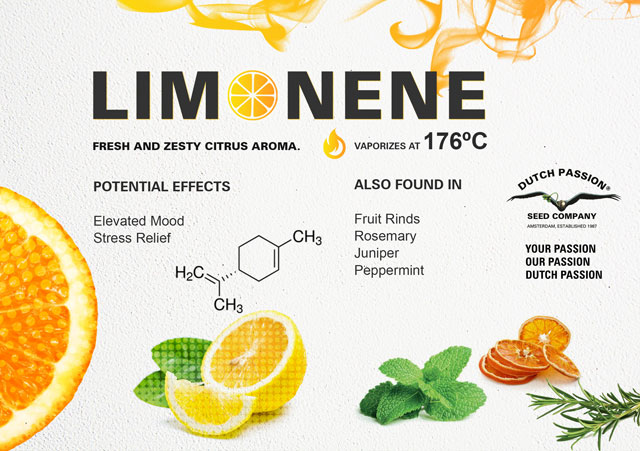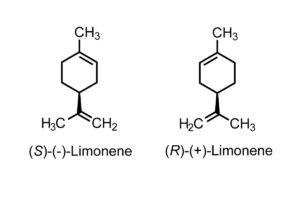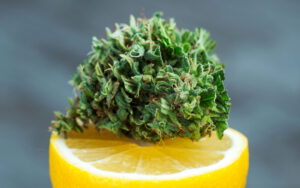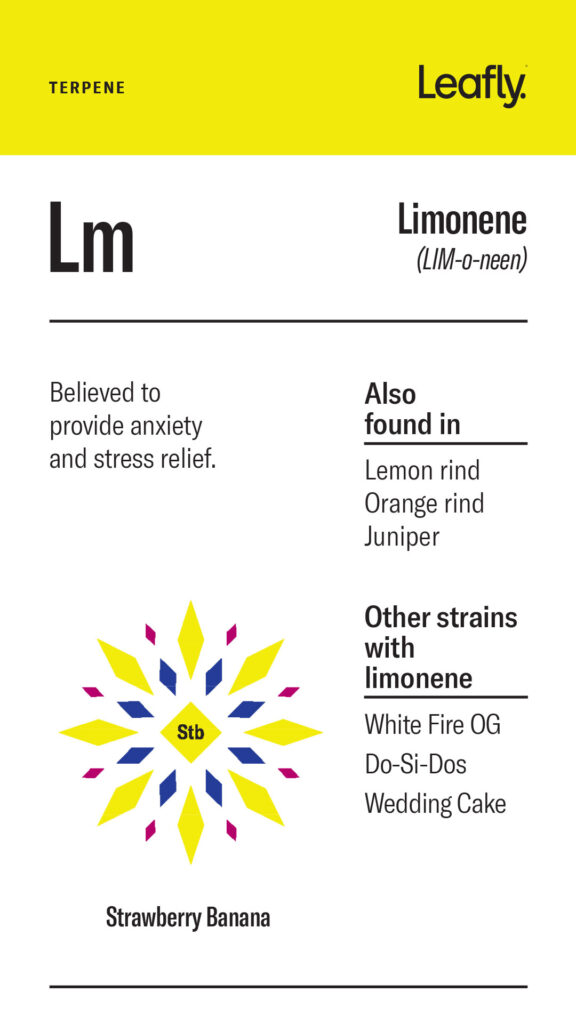
Limonene is a type of terpene, which is an organic compound produced by plants. As cannabis lovers know, many of the health benefits and effects derived from weed come from terpenes. There are at least 100 terpenes in the cannabis plant, each one changes the effect of the strain.
Limonene is in most citrus fruits, explaining the lemon and orange filled scents of many strains. It’s excellent at melting stress while brightening moods, and medically, contains cancer-fighting powers that also bust inflammation. It also facilitates improved absorption of other terpenes and has potent bacteria and fungus fighting properties.

Aroma: Citrus Vaporizes at: 348ºF (176ºC) Potential effects: Elevated mood, stress relief Potential therapeutic value: Treatment of anxiety, depression, inflammation, pain, and cancer Also found in: Fruit rinds, rosemary, juniper, peppermint
Limonene isn’t limited to just ingestible substances though. It also has many other uses such as cosmetics, perfumes, medicines, and cleaning products and can even act as a solvent to help remove oil and add aroma: it provides a turpentine-like effect.
Limonene in Plants
Limonene is a naturally occurring monoterpene that plants possess for a reason – it is used to ward off predators and dissuade insects from invading. It’s found in the rinds of citrus fruits (namely lemons and oranges), rosemary, peppermint, juniper, and in pine needles.
Limonene also gives plants their unique fragrance and flavor, which is why some cannabis strains that are high in limonene are named after lemons. Super Lemon Haze, for example, is naturally high in limonene which gives it the citrus scent and tastes that it’s named after.
Limonene and Cancer
How can terpenes hinder cancer’s ability to either start or spread?
Well...according to a study conducted by the Department of Biology at Purdue University, limonene does possess anti-tumor activity. In rodents, it offers chemopreventative benefits against skin, liver, stomach, and mammary cancer (the rodent’s version of breasts).
In a similar study done by AMC Cancer Research Center in Denver, Limonene is also anti-inflammatory, something that may prevent cancers from occurring in the first place. Inflammation is a critical part of cancer development and progression. This is why so many cancers arise from sites of infection, chronic irritation, and long-term inflammation (short-term inflammation helps heal the body while long-term destroys its tissues).
It’s believed limonene is effective because it promotes a process that results in carcinogen detoxification and leads to apoptosis, a circumstance where cancer cells go off and die. According to Self Hacked Science-Based Information, “Limonene prevents the growth of cancer cells by inhibiting G proteins that are involved in cell signaling pathways that induce cell growth.”
However, the above results were achieved when the rodents were either injected with or ate foods rich in limonene. It should be noted that these test results might not completely relate to humans. After all, injecting a rodent with pure limonene isn’t exactly the same as a human smoking cannabis
Limonene and the Immune System
Limonene gets its name from lemons, so it may come as no surprise that limonene is thought to enhance the immune system as well. Lemons contain vitamin C and there is extensive research that shows vitamin C can help you fight the common cold. But what about Limonene and the immune system? Although research in this area is underdeveloped, there have been a few studies that suggest it may be beneficial. 
In a study done by the Department of Biology, Lebanon Valley College, it was concluded that “[The data suggests that] d-limonene possesses immunomodulatory activity that must be considered when utilizing the compound for therapeutic or commercial purposes.” Immunomodulatory activity refers to the way a substance affects how the immune system works. So when Limonene was introduced into the body, it did affect the way the immune system functioned by increasing immune system cell count in the body.
In another study published by International Immunopharmacology, it was found that “…in addition to reported properties, D-limonene modulates the immune response with significant potential for clinical application.” They found this result when testing the T-cell count in mice that were injected with pure Limonene.
Once again, it’s important to note that these tests were not done in relation to cannabis directly. Studies regarding limonene are still in their early years and studies of the effects of cannabis and limonene together do not yet exist. The lack of cannabis research is likely due to legality issues regarding the plant. If cannabis was nationally legalized, perhaps we would see an influx in cannabis studies.
Strains High in Limonene
Now that you know why limonene is an intriguing terpene, you might be craving a strain with a fresh, citrus taste. Your local budtender can help guide you in the right direction, but here are some strains worth giving a try:
Super Lemon Haze: Super Lemon Haze provides a social, uplifting, and energetic high that’s great for use during daylight hours or when you feel like engaging in conversation. It elevates the mood and helps relieve chronic stress, anxiety issues, and depression. It’s also used for minor pain relief as well as nausea and loss of appetite.
Lemon Kush: The high from Lemon Kush is a bit delayed, taking ten or so minutes to come fully into fruition (so be aware if you’re a first-time smoker). When it does, it offers acute and focused cerebral effects. It’s been used to compound creativity and help with free association of thoughts. Many users like it because of the clear-headedness it provides: you’re high but not so much that you can’t get anything done. It might even prove conducive to getting the mundane accomplished: smoke up before you conquer spring cleaning.
Lemon Skunk: Lemon Skunk is high in THC (hovering around 22 percent). It provides users with a sense of well-being, cerebral stimulation, and introspection. Some users experience frank exhilaration while others find that it inspires creativity. It can be somewhat sedating, which you may or may not like. New users should reserve this strain for nighttime use until they build up a bit of tolerance. This strain is known to cause dizziness too, especially in high doses. Just something to know in the event you’re planning to drive, operate heavy machinery, or walk across a tightrope without a net below.
Although the research regarding the effects of pure limonene is young, it is a promising step forward for cannabis lovers. It opens up the discussion that perhaps consuming cannabis rich in limonene could have beneficial health results. But until the scientific community begins to study the effects of smoking strains rich in limonene, we just don’t know for sure.
